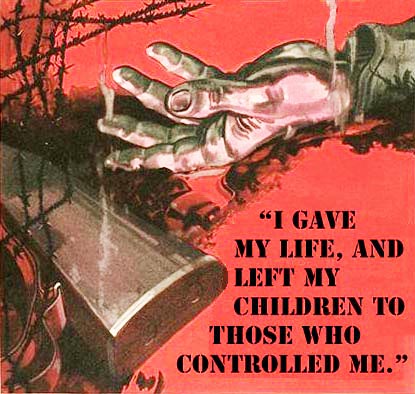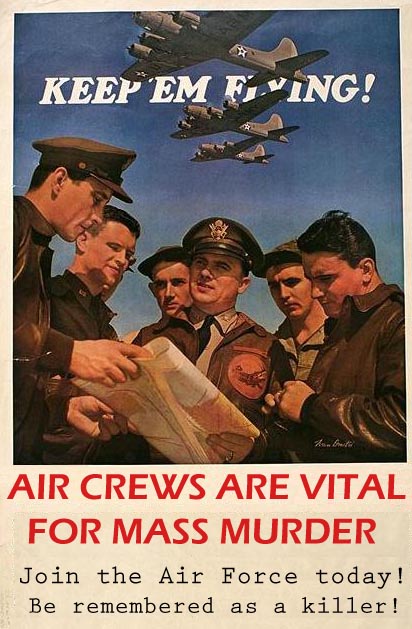|
|||||||||||||
|
as a Symbol By Punkerslut
Sometimes it is called Patriotism, and other times, it is called Nationalism. We understand that it is a morality focused on a nation, an ethical system based on a particular, geographic region. It may idolize one culture over all others, or it might make a particular religion a requirement for consideration -- or, it might even value only one right, and demonize all others. This language of national loyalty is spoken by all politicians. "To love your country," "to defend the nation," and "to glorify your homeland." The philosophy of the Nation has taken many forms, from African nationalists to Nazi nationalists, from Islamic theocrats to Israeli Zionists. But, what does this obscure and abstract symbol of the Nation really mean? The ideal of Nationalism makes this thing called our country the beginning and ending of our interests. We may be united as families, as communities, in stronger or weaker ways. But the Nationalist wants us to be united as a nation and divided as a globe. The judgment of what is right or wrong does not ask who committed the crime, and it does not ask for evidence. It only asks one question. Was it our side attacking their side, or was it their side attacking ours? They are the same thing, but one will be praised as a victory of liberty, and the other will be vilified as the greatest cruelty. But, then it is a question of what is the nation? As, it can be certain that the Nationalist cares for their nation, but not their nation's people. They subject them to endless wars for profitable colonies -- they turn children in murderous and vicious soldiers, only to spread slavery over foreign lands. We can see from the pattern of Patriotism that it is not the valuation of the people of a particular country. It is the valuation of something else -- something far more uncertain, abstract, and undefined.
When homelessness and poverty are rampant, the Nationalist politicians and political parties want to go to war. They want to rip apart some foreign land and to uproot some people from their homes. As a patriot, one is more concerned with the idea of the nation than with the people of the nation. Where they could advocate and investigate methods of improving their peoples' lives, they instead sacrifice them by thousands into the jaws of battle. What America Wants and What the American People Want are two very distinct, separate things. No greater proof can be found than in the Nationalist politicians who worship America, but completely neglect the American people. In those who steal lands across the globe to benefit companies, but paying for them in the blood of the poor. The Nation, as recognized by those who most fervently believe in it, is an identity. People see themselves as involved with this thing -- as if they were united and driven toward a common end with this object. It is an idea they have chosen to identify themselves with. One could see themselves as connected to their job, a hobby, a community, or an organization. They could choose for themselves any identity, whether it was as a biology enthusiast, or an iron refinery union worker. They can see themselves connected, and united with a common aim, with any group of people around them. But the Nationalist chooses and recognizes the Nation first and foremost.
Why would someone choose their country? Why would they choose national flags for decoration and patriotic slogans for daily speech? Why would you identify with a particular, geographic body on the map? If we know the history of nations, then we know that borders are artificial constructs of humanity. They are not natural separations, dividing these people and those people. They are placed there by dictators, kings, queens, presidents, and congresses. They do not exist to group together natural interests; they exist because it was as much land as one politician could exploit out of another. It was as much as one national government was capable of threatening another to give up. It was as much as could be taken with the slowly blood supply from the tenements and ghettos of the poor. An American patriot in 1790, in 1890, and in 1990 are all completely different human beings. Each of them, in examining what they call their country, is looking at completely different borders and completely different peoples. Not just different families and people, but infusions and mixing of different races and cultures. To say, 'I Love America,' has been something different for every new generation of patriots and nationalists. They pick some borders on a map from a particular time era, and say 'this is my country, I identify with it!' In a short examination, you can clearly see why such an identity is hollow, meaningless, and above all, uncertain. To the glory of the nation, where its peoples' bellies are empty! To the mastery of our country, when we subject our children to endless battlefields! And to the domination of our way of life, even if it must kill others for it!... This is Nationalism. It is the worship and idolization of one area and a specific, dominant culture. If Nationalism is to idolize a stretch of land enclosed by borders, then what does that mean about it as a social movement?
The nation is not its people, but its more than just its land. It's a way that certain people have to decided look at themselves. It's this construct that exists only in the mind, that citizens see as either dominating or dominated. It fights, not with the land or the peoples of other lands, but with the other artificial constructs of nations. The Nationalists push their nations into wars, restrictive borders, military drafts, and inhuman violence through prisons and forced labor camps. They want to impress their nation's greatness upon the world, to prove a superiority to the countries of the world -- to make people see, in their imaginations, the artificial construct of America defeating Iraq, where it really is the bombing of civilian areas. For all styles of Nationalism, no matter what continent they come from, they are all in this form. They all demand respect and a type of humility from the consciences of the world; even if it must be gained by conquering, violence, and mass killing. Whether it is Pan-Arabic Nationalism, the Nationalism of the Catholic Church, or Pakistan Nationalism, they all proceed upon points. They do not concern themselves with resolving social ills, ending poverty or helping they people. As their final end, they see themselves as a dominant identity, feared and controlling in the global sphere. It is one country competing against all other countries. All the world, except for one particular region, is made suspect, hated, and even, a foe in wars. It does not ask whether you are capable of suffering, whether you hunger, too, or whether you have ideas about the world around you -- it only asks whether you are an American or not. It only asks whether you are from the same region, with the same language, educated an identical culture, and brought up praying to the same god. By turning itself against the majority of humanity, Nationalism makes itself an inhuman morality.
Punkerslut,
|




